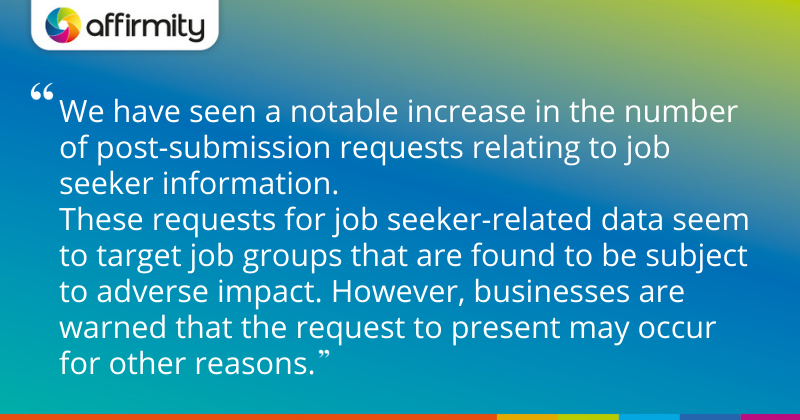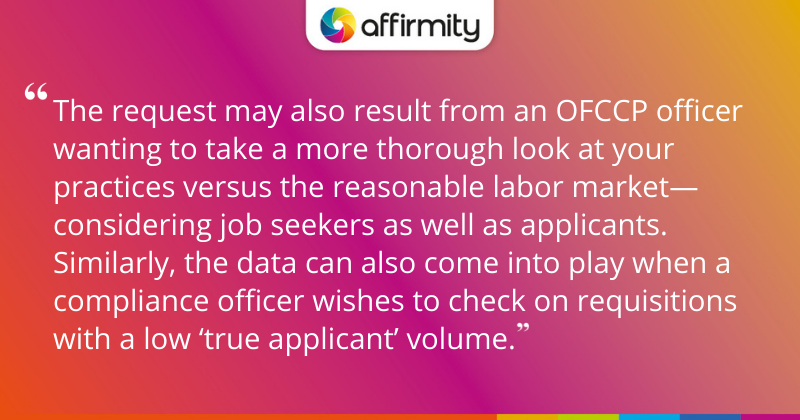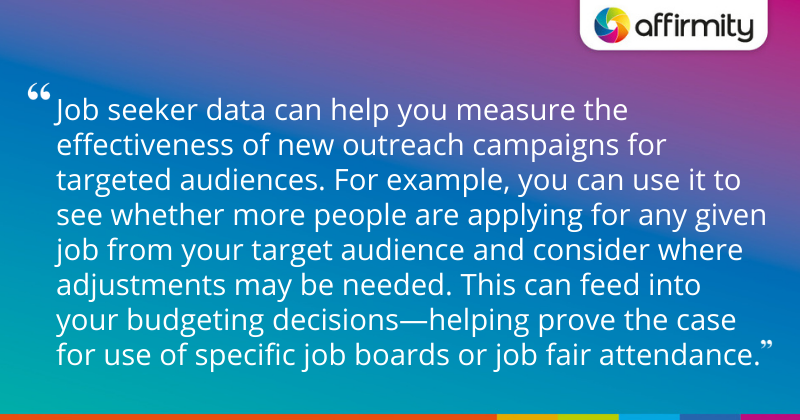If your organization is a federal contractor or subcontractor, you probably already retain applicant data—but are you also fulfilling your obligation to retain separate job seeker data? In this blog post, we consider the difference between the two datasets, the reasons why this data is increasingly being requested, and why it’s important for your own processes.
The Situation: Increasing OFCCP Requests for Job Seeker Information
As OFCCP auditing activity evolves, our experts notice patterns in the kinds of requests our customers receive from their OFCCP compliance officer. Most recently, we have seen a notable increase in the number of post-submission requests relating to job seeker information.
These requests for job seeker-related data seem to target job groups that are found to be subject to adverse impact. However, requests haven’t been exclusively for this purpose: businesses are warned that the request to present may occur for other reasons.

The Scope: Who Is a Job Seeker, and Who Is an Applicant?
Job seekers are individuals who apply for an open position but do not meet the definition of an applicant. This is because, per the OFCCP’s Internet Applicant Recordkeeping Rule, ‘true’ applicants must meet all four of the following criteria:
- The individual has submitted an expression of interest in employment through the Internet (or related electronic data technology).
- The contractor has considered the individual for employment in a particular position.
- The individual’s expression of interest indicated that the individual possesses the basic qualifications for the position.
- The individual at no point in the contractor’s selection process prior to receiving an offer of employment, removes themself from further consideration or otherwise indicates that they are no longer interested in the position.
Expressions of interest that don’t meet all of the above criteria are considered “job seekers”. For example, someone who merely asks for more information about a position, someone who applies for the position but does not meet minimum qualifications, or someone who drops out of the process due to accepting a job offer elsewhere, would not be considered an “applicant”.
RELEVANT READING FOR APPLICATIONS | ‘4 Key Considerations for Building an Inclusive Work Environment for Individuals with Disabilities’

The Rationale: Why Does the OFCCP Need Job Seeker Data?
The OFCCP may be requesting this information for a variety of reasons. It may simply be asking for the data as a way of testing the integrity of your record retention—your processes and systems should support relatively easy recall of this data. The request could also straightforwardly be the result of a complaint filed by a job seeker or applicant, requiring a more thorough investigation of your pipeline.
The request may also result from an OFCCP officer wanting to take a more thorough look at your practices versus the reasonable labor market—considering job seekers as well as applicants. Similarly, the data can also come into play when a compliance officer wishes to check on requisitions with a low ‘true applicant’ volume. Such requisitions can appear favorable when only applicant data is available. But a different picture may emerge when job seekers are considered.
LEARN MORE ABOUT AUDIT DATA PREPARATION | ‘Tools and Processes to Help You Prepare for OFCCP Audits’

The Bottom Line: Why It’s a Good Idea to Maintain Job Seeker Data
First and foremost, this is data that contractors are obliged to maintain. Though job seeker information isn’t a core element of the typical audit submission, organizations are still required to retain the records alongside their true applicants.
The length of time you are required to keep these records depends on your headcount and the dollar threshold of your federal contracts and sub-contracts. The OFCCP’s latest actions are a timely reminder that you can and will be called upon to prove that you are keeping this data—so make sure you have reviewed your requirements carefully and are abiding by them!
Thankfully, you also stand to benefit from retaining this information. Job seeker data can help you measure the effectiveness of new outreach campaigns for targeted audiences. For example, you can use it to see whether more people are applying for any given job from your target audience and consider where adjustments may be needed. This can feed into your budgeting decisions—helping prove the case for use of specific job boards or job fair attendance.
Finally, job seeker data has a role to play in your wider diversity and inclusion strategy, outside the more limited scope of your AAP-focused analysis. It could be used to prove effectiveness in certain business units and functions, or in your overall organization, if the data effort is scaled accordingly.
MORE ON EXPANDING BEYOND COMPLIANCE | ‘How to Connect Your Pay Reporting Requirements to Your Pay Equity Efforts’
OFCCP Audits: How to Prepare and Respond
Discover more OFCCP audit preparation and response advice in our recent guide offering a deep dive on the subject. Topics we cover in the full guide include:
- The six different types of audit/focused review, and what you can expect from each
- The preparatory measures you should take year-round, when notified of an audit, and before your final submission
- Practical and useful tools and template documents that will help you manage the process
- Our top seven lessons learned through years of helping clients submit their responses to the OFCCP
- A round-up of frequently asked questions that drill into some specific scenarios and common concerns
Download the full guide today.
Are you preparing for the upcoming OFCCP audit cycle? Contact us to learn more about our consulting services and software solutions.
 About the Author
About the Author
Aly Ferguson is a Senior Business Consultant for Affirmity and has been with the organization for over eight years. She consults with clients in a variety of industries concerning OFCCP/EEO compliance along with diversity planning, implementation, and measurement.
